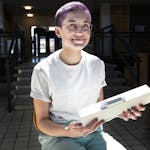The summer after Kyle Woody's former wife was diagnosed with colon cancer, some of the couple's friends came to visit. Kyle and Sarah had planned an entire itinerary for their stay, but the friends interrupted the plan.
"We're here to serve you," they said, all the while looking at Kyle.
He doesn't remember his exact response — that moment was about eight years ago — but he figures he scoffed and replied with something like, "That's preposterous. Sarah's the one with cancer. I'm fine."
Later, while journaling in a hotel room, Woody let his friends' message sink in. In the process of caring for his wife and two children, he didn't realize that he, too, needed support.
That awareness prompted Woody to found a nonprofit called Jack's Caregiver Coalition, aimed at providing camaraderie and support to men caring for loved ones with cancer. The namesake, Jack, was the man who'd originally given Woody's friends the advice to remember the caregiver.
While there are many resources for cancer patients, Woody realized that caregivers, particularly men who aren't accustomed to asking for help, needed a way to connect with each other.
"We saw the opportunity to create something founded by and designed for guys to hit head-on the fact that men are caregivers and really lean into what that means and what they need," he said.
Jack's (jackscaregiverco.org) now has several programs for caregivers, including monthly social outings (before the COVID-19 pandemic) that took men indoor sky diving and gave them a chance to try ice carving with chain saws and water jet-packs on Lake Minnetonka. Other programs include coed group sessions for caregivers and one-to-one matches between members who can rely on each other's support.
Their main event, "Cold Ones 4 Caregivers," will be held online and in person Sept. 12. (Go to tinyurl.com/y3af5kl6.)
As Woody sees it, the entire family benefits when the caregiver can get away for support and social time. Woody isn't a therapist or a social worker and neither are the other staff members with the organization.
"But sometimes, that's exactly what guys are looking for," he said, explaining that he wanted to provide multiple entry points for men who may not otherwise seek out a traditional support group.
Kelly Grosklags has a private psychotherapy practice in Minneapolis specializing in cancer and grief. As she travels around the country, she often finds herself talking about the mission of Jack's and wishing there were chapters in every state.
"Jack's really normalizes and validates that men also need support," she said, adding that men may feel societal pressure about how they can and can't express emotion. "Once the men see other men being vulnerable, it gives them permission to be vulnerable, too."
While not a replacement for traditional therapy, Grosklags said a social group like Jack's can be an important steppingstone for caregivers to know they don't have to shoulder the realities of caregiving alone.
Aaron Hill's wife, Kathryn, was diagnosed with Stage 4 lung cancer in June 2016. She was 37 at the time and pregnant with the couple's fifth child. The baby died a few weeks later and Kathryn's cancer moved into her spine and she became a paraplegic. With help from his in-laws and some in-home nursing assistance, Hill cared for Kathryn's wound from surgery, managed her medications, helped her dress, transferred her into and out of bed and repositioned her throughout the night.
He often turned to the Jack's Facebook page and Woody for support. Kathryn died in August after battling cancer for four years.
"It's been helpful to know guys who have gone through the whole spectrum of this and can give the encouragement and advice at the right times," Hill said.
He's only been able to get away for one social activity through Jack's. He joined others at an indoor golfing range and said it was a good time to recharge and be social.
"There really wasn't a whole lot of cancer conversation," he said. "It was so nice to just do something fun. You have so many responsibilities as a caretaker and you can sometimes feel guilty to step away from them. But it was really important to do so and connect with the other guys."
Last summer, Ishmael Israel was in the middle of a separation from his wife and had just finished the first day of the two-day bar exam when he found out his stepson had been diagnosed with sarcoma cancer.
"It was hard to feel like I could smile," Israel remembered. He was connected with Jack's and joined a tour of a local brewery.
"It was the first time I felt like I was able to actually talk to somebody," he said. Cancer wasn't the topic that night, but it was a commonality he knew he shared with the men around him.
Eric, Israel's stepson, died just before Thanksgiving last year. He was 20 years old.
Israel is now deep into studying to retake the bar exam, but he's stayed in touch with Jack's members through phone calls, Zoom and e-mails. He wants to remain a part of Jack's because he can offer other men the perspective of someone who has lost their loved one.
"I know there's going to be another me that comes in — someone who feels guilty for smiling, who feels like they've let down their child," he said. "Cancer is something you actually have to have gone through … to offer real help to someone in the same space."
Woody, whose ex-wife died in July, agrees. He wants to continue to grow Jack's network of men who are caregivers for someone with cancer.
"There's such a big gap between how many of these guys are out there and how many we have the opportunity to serve," Woody said. "We absolutely want to close that gap."
Mara Klecker • 612-673-4440





